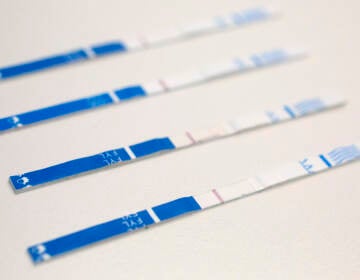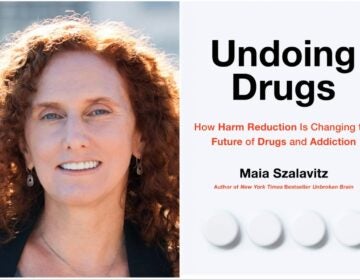Gov. Carney signs legislation establishing nation’s first overdose care system
Carney signed three pieces of legislation Monday aimed at addressing overdose deaths.
Listen 1:41
Gov. John Carney signed three bills aimed at addressing Delaware's opioid crisis. (Zoe Read/WHYY)
Gov. John Carney, D-Delaware, signed three pieces of legislation Monday aimed at addressing overdose deaths from heroin and other drugs.
The new laws set in motion recommendations from Delaware’s Behavioral Health Consortium. Chaired by Lt. Gov. Bethany Hall-Long, the group of health officials, law enforcement, state leaders and advocates are working to enact 114 recommendations to address the opioid epidemic in Delaware — where 345 people died of overdoses last year.
One measure establishes the nation’s first overdose care system. It sets up standards for “stabilization centers” to take over caring for overdose patients once they are released from hospitals or first responders. Individuals will receive a multifaceted approach to care, addressing both their medical and social needs, to prevent a relapse.
“It will be the first in the nation for a system that will be working with first responders, fire service, paramedics, the emergency rooms, and instead of sending someone home we will hopefully get someone in treatment — and that is the difference,” Hall-Long said.
“When you have a heart attack or stroke they don’t give you one dose of medicine and send you home. That’s what we’ve been doing with persons who have an overdose — we often times, if it’s a mental health breakdown or a substance use break down, we send them home. So now the goal is to have these stabilization centers and getting them into treatment.”
Dave Humes of atTAck Addiction cautions the state must act with urgency to get the stabilization centers up and running.
“We’ve heard anecdotes by users who leave the emergency room and use again. We’re told the reason this happens is they’re in withdrawal and they’re trying to take the edge off. If we can take these people to stabilization centers rather than the emergency room and give them treatment they won’t have to go out and use again,” he said. “The stabilization centers are going to offer a more conducive and humane atmosphere to manage withdrawal and get them the help they need.”
Another law will analyze overdose data collected by the state and compare it with the state’s prescription monitoring program. Legislators say while 2,000 individuals survived overdoses last year, many continued to be prescribed opioids. The legislation aims to coordinate data sharing in order to examine overdoses and prescribing, and create best practices for prescribing. The new law enables the state to educate healthcare professionals who are frequent prescribers of opioids.
The third law encourages prescribers and patients to use non-opioid methods to treat back pain, from acupuncture to physical therapy to chiropractic care.
“I do have hope,” said one of the bills’ sponsors, state Rep. Helene Keeley, D-Wilmington.
“We have to understand we’re fighting a battle of people who are selling things to our children, and sometimes doctors who are overprescribing drugs to individuals, and we have to keep fighting, because no one wants to wake up and hear someone passed away the night before because of an overdose.”
WHYY is your source for fact-based, in-depth journalism and information. As a nonprofit organization, we rely on financial support from readers like you. Please give today.





